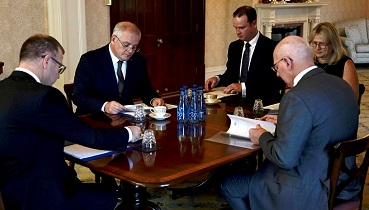The Australian Alert Service is the weekly publication of the Australian Citizens Party.
It will keep you updated on strategic events both in Australia, and worldwide, as well as the organising activities of the Citizens Party.
To subscribe to the Australian Alert Service, it's easy, and it's secure.
Lead Editorial
24 August 2022
Vol. 24 No. 34
In breaking news, the New Zealand government has just bought Kiwibank off NZ Post. As the owner of NZ Post, the transaction makes no difference to the government’s net financial position; but it is a positive development, because it means that after years of neoliberals in NZ’s government and on Kiwibank’s board undermining the postal bank, the NZ government has taken full control of and responsibility for Kiwibank, with the stated intention to expand it. This means it can now realise its potential to function as a true national bank that serves the NZ people and takes on the Australian Big Four-owned private banks. This sets an important precedent for our postal bank campaign in Australia that we must ensure is noticed by the federal government. The AAS will report more on this development next week.
It’s a striking contrast to the scandal in Australia over the naked power-grab by a prime minister who first and foremost served elite vested interests, starting with the banks.
If Scott Morrison had won the 2022 election, it’s possible Australians would still not know that our PM had seized for himself unprecedented power. What could he have done with that power in the circumstances of a crisis, such as a war with China that his government was well on the way to provoking? There are lessons to be learned from this scandal, elaborated in this week’s AAS, which Australian citizens must take to heart.
First, Morrison’s actions betray a PM increasingly desperate to grab and maintain power, to the extent he had no confidence in his own colleagues. Morrison led a government that stood against the returning tide of public opposition to the neoliberalism that for four decades has concentrated power in the elite corporate interests which control his party. For example, he tried to protect the banks from the banking royal commission, and then spent his entire period as prime minister ensuring that the royal commission went nowhere, and the banks could continue untouched. Meanwhile, whenever the Australian people needed his help, he repeated variations of “I don’t hold a hose, mate”. This required a shameless arrogance that increasingly turned the public against his government, which evidently led Morrison to believe that he needed even more direct power.
The Citizens Party’s 20 August Citizens Report on YouTube, headlined “Morrison’s Mussolini moment”, detailed how Italian fascist leader Benito Mussolini similarly took control of multiple ministries in his government, on behalf of corporate interests. This positioned Mussolini to establish a fascist dictatorship under crisis conditions. In Morrison’s case, he seized control of the most powerful Ministries, which are also the ones with the most discretionary “delegated” powers (p. 4) that are not disallowable by Parliament.
Another lesson is what Morrison’s actions reveal about executive power in Australia. See the Australian Almanac for a description of the enormous reach of the Crown’s executive power, both in the UK and under the Australian constitution, which is the power under which Morrison was able to take secret control of the Ministries, entirely legally. Under British tradition, the only limits on the Crown’s executive power are conventions, which are not actually legally binding, as seen in Morrison’s actions, as well as in the 1975 dismissal of Gough Whitlam by Governor-General Sir John Kerr. The system ensures that our democracy remains subservient to the oligarchical power the Crown represents. This power isn’t exercised in normal times, but is there to be used when it matters, namely when a democratic impulse becomes a fundamental threat to oligarchical control (rule by few).
The system is not all-powerful though; the greatest fear of oligarchies is the truth that “we are many, they are few”. The people who learn these lessons can change the system, through policies that restore the power of the people, such as a public post office bank, which puts banking at the service of the people again.
In this issue:
- Six-faced Morrison must answer for his abuse of Holgate
- Preparing for crisis? Morrison’s secret regime
- Governing by decree
- Senate inquiries demand legislative accountability
- Support surges for nationalisation but UK Labour reneges
- Must watch: An urgent warning to Australia
- Putin: Unipolar world is ‘a thing of the past’
- Africa pushes back against Anglo-American bullying
- Ukraine party bans challenged as violating civil rights
- Ex-minister Robson writes to New Zealand PM on blacklisting by Ukraine
- Garbage in, garbage out: UN rapporteur regurgitates ASPI’s ‘forced labour’ lies
- The truth is disruptive
- How would Diana feel about Ukraine using petal mines?
- ALMANAC: The dictatorial powers of the Queen–and her Governor-General
Click here for the archive of previous issues of the Australian Alert Service








